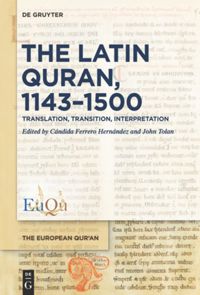Éditeurs
Cándida Ferrero Hernández, Universidad Autónoma de Barcelona, Spain
Professor Mercedes García-Arenal is a Research Professor at Consejo Superior de Investiagaciones Científicas, Madrid and the world’s leading expert on Muslim minorities in Iberia. Her work focuses on the religious history of the Muslim West, mainly on religious minorities : conversion, polemics, messianism, religious dissidence, and dissimulation. She has focused on the impulses of assimilation and rejection by mainstream societies of religious minorities such as Muslims and converted Muslims in Iberia and Jews in North Africa. Much of her research is based on Inquisition documentation. She has cultivated long-term research interest in the study of religious minorities and religious conversion from a new methodological vantage point. She has thus been increasingly drawn to the small-scale, singular study of individual experiences that suggest a process of gradual disengagement, involving closely entwined yet competing notions of religion and group belonging, in cases that illustrate how formal institutions of power function while handling people’s affairs. Among the latter she has been especially interested in individuals who walk away from groups, and in looking at groups through the eyes of the disaffected and the uncommitted.
John Tolan, Université de Nantes, France
Professor John Tolan is a leading expert in medieval European anti-Muslim polemics and in the history of European perceptions of Islam. He is currently Professor of Medieval History at the University of Nantes and a member of the Academia Europæa. He is co-director of the Institute for Religious Pluralism and Atheism (IPRA) and coordinated the European research programme Religion and Law in Medieval Christian and Muslim Societies (RELMIN) (ERC Advanced Grant) on the legal status of religious minorities in the Euro-Mediterranean area (5th–15th centuries). Professor Tolan has published more than 55 articles in international journals and collected works and author of ’Latin Europe and the Arab world in the middle ages : Cultures in conflict and convergence’ and ’Sons of Ishmael : Muslims through European Eyes in the Middle Ages’. His latest book ’Faces of Muhammad : Western Perceptions of the Prophet of Islam from the Middle Ages to Today’ is available from Princeton University Press.
Présentation

In 1143 Robert of Ketton produced the first Latin translation of the Qur’an. This translation, extant in 24 manuscripts, was one of the main ways in which Latin European readers had access to the Muslim holy book. Yet it was not the only means of transmission of Quranic stories and concepts to the Latin world : there were other medieval translations into Latin of the Qur’an and of Christian polemical texts composed in Arabic which transmitted elements of the Qur’an (often in a polemical mode).
The essays in this volume examine the range of medieval Latin transmission of the Qur’an and reaction to the Qur’an by concentrating on the manuscript traditions of medieval Qur’an translations and anti-Islamic polemics in Latin. We see how the Arabic text was transmitted and studied in Medieval Europe. We examine the strategies of translators who struggled to find a proper vocabulary and syntax to render Quranic terms into Latin, at times showing miscomprehensions of the text or willful distortions for polemical purposes. These translations and interpretations by Latin authors working primarily in twelfth- and thirteenth-century Spain were the main sources of information about Islam for European scholars until well into the sixteenth century, when they were printed, reused and commented. This volume presents a key assessment of a crucial chapter in European understandings of Islam.
Website of the ERC Synergy Project : ‘The European Qur’an. Islamic Scripture in European Culture and Religion 1150-1850 : (EuQu)’ https://euqu.eu
(Credits Photos : Workshop "Qur’an and Bible" : https://forms.gle/HwajqEuRWoG4zaLs8)
